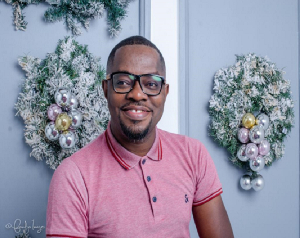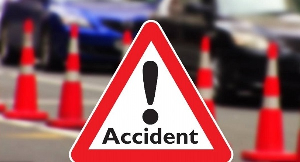Happy New Year, my friends. I had my first prayer request this year and want to share it with you.
Growing up, my first ambition was to be a chartered accountant. In the 80s and early 90s at Dichemso, Kumasi, where I lived, I had always envied a certain man called Mr. Owusu Ansah, who was a chartered accountant and with four of my elder siblings all studying accounting; I was naturally going to follow suit and build my dream of becoming a charted accountant, but as is said in the Christian world, man proposes, while God disposes.
My attention was drawn to the fact that I could make a career in communications when, as the School Prefect of KNUST Senior High School, my mock examination in English got the attention of our English master. She felt that my short story on disobedient Esi was great. She advised me to pay attention to my storytelling abilities. She promised to edit my future stories because my grammar needed checks and balances. After my senior high school, and by the grace of God, I published my best-selling novel Dear Mama Why So Soon. It is still my best-selling novel. The rest, they say, is now history. I studied at the Ghana Institute of Journalism and became a professional in communications. I have then stayed in the profession for over two decades now.
As an expert and consultant in brand communications with over 20 years of experience, I have recently witnessed a disturbing trend in Ghana's media, especially within the social media landscape. Our social communication has taken a serious and different turn from the one I used to know growing up.
In my mother's house, you dare not speak back angrily at your elders, not even think of insulting your elders. This was a taboo in my circles.
Today, I rarely turn on my radio or TV in the morning to listen to current affairs shows and not hear presenters using serious and insulting language at leaders. Sometimes, I feel embarrassed because innocent children watch and learn from these behaviours.
It pains me to see how some of my very good friends and even students resort to insults and derogatory language on social media when expressing their opinions about policies, believing it to be the only way to gain attention and traction. This approach undermines the principles of effective communication and sets a harmful example for the youth and the broader society.
Some months ago, TV3 invited me to be on a panel on one of their shows when the Yvonne Nelson- Sarkodie issue came up. I was just invited to speak on personal branding and the effects the feud between these two great brands would have on their brands. I thought I did my work as an educator and came home to enjoy my Fufu. When I was sitting quietly, trying to factor out how I could survive this economic hardship, I just went on my social media pages. Lo and behold, when I clicked on a story Ghana Web had done from my commentary on the “I AM NOT Yvonne Nelson saga”, I just said to myself wow wow wow. The Sark Nation fans have taken me to the cleaners. They insulted me potopoto.
I thought respectful and constructive dialogue was a great way of shaping public opinion and influencing positive change and that the prevalent culture of insult in Ghana's media and social media spaces is at odds with these principles. Instead of fostering meaningful discourse and promoting informed decision-making, insults create a toxic environment that stifles genuine dialogue and perpetuates division.
This state of our social media discourse is particularly troubling because of its potential impact on youth. My very good friend, Hon. Sam George, believes that the promotion of LGBT++++ poses a serious threat to the youth and his children, and in as much as I may agree, I also fear that the present state of our social media discourse poses much more danger to our society.
As a society, we are responsible for setting a positive example for the next generation and demonstrating the value of respectful and constructive communication. When young people are exposed to a steady diet of insults and derogatory language, it shapes their perceptions of acceptable behaviour and communication norms, potentially leading to a normalisation of disrespect and incivility in their interactions.
It is crucial for all stakeholders, including media organisations, regulatory bodies, educators, and parents, to address this issue collectively. Media organisations should uphold ethical standards that discourage insults and promote responsible social communication or, if you like, journalism. I think bodies like the National Media Commission, GJA, IPR, etc., should up their game by enforcing these standards and holding media outlets accountable for promoting respectful discourse.
Educators and parents, on the other hand, should educate young people about the importance of respectful communication and critical thinking skills. Our pastors must also rise and preach this kind of sermon and stop the doom-doom prophecies, to think that some pastors are also insulting each other left and right on social media.
A Pastor can put a camera in front of him and start insulting his colleagues’ pastors left and right and feel proud. Oh, Awurade Yesu, bra na bƐgye wo mma. This is troubling.
The culture of insult in Ghana's media and social media landscape is a cause for concern that requires urgent attention. As someone deeply invested in the communications field, I urge all stakeholders to recognise the harmful effects of this trend and work together to promote a respectful and responsible communication culture in 2024, especially since this year is an election year. Doing so can ensure a more informed and constructive public discourse that benefits our society. Our social media communication must bring dignity to one another while promoting effective and efficient dissemination of information.
I Pray!!
Opinions of Saturday, 22 June 2024
Columnist: Dr. Ike Tandoh, APR
The dangers of insult-driven communication – My reflections
Opinions














